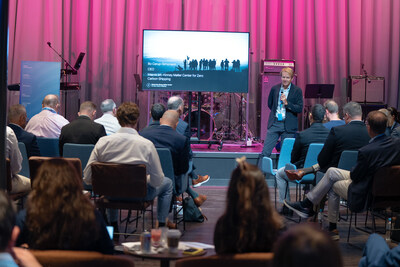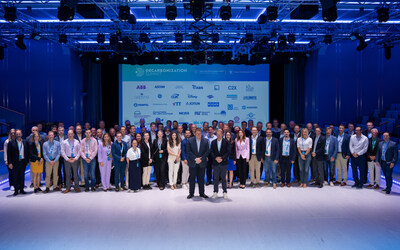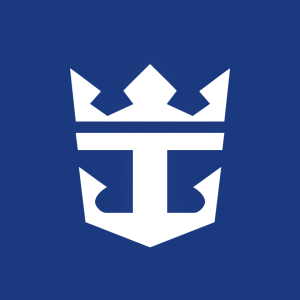Cruise and Maritime Industry Set Recommendations to Accelerate Path to Net Zero
Royal Caribbean Group (NYSE: RCL) hosted a Decarbonization Summit in collaboration with the Mærsk Mc-Kinney Møller Center for Zero Carbon Shipping. Over 70 maritime leaders gathered to discuss strategies for achieving net zero emissions in the cruise and maritime industry. The summit focused on three key areas: technology development, alternative fuel opportunities, and policy and regulation.
The event concluded with three main recommendations:
- Create an independent platform to share findings from pilot and testing programs
- Establish a third-party platform to aggregate low-carbon fuel demand by location
- Develop a set of principles outlining critical policy actions for the International Maritime Organization (IMO)
These initiatives aim to accelerate the industry's transition to sustainable and scalable decarbonization solutions over the next 25 years.
- Royal Caribbean Group is taking a leadership role in industry-wide decarbonization efforts
- Collaboration with 70+ maritime leaders across the ecosystem to address sustainability challenges
- Focus on developing practical solutions for technology, alternative fuels, and policy to achieve net zero emissions
- Significant challenges remain in achieving net zero emissions for the maritime industry
- Potential increased costs associated with implementing new technologies and alternative fuels
After three-day event aboard Royal Caribbean Group's soon-to-sail Utopia of the Seas, leaders coalesced on three key suggestions to advance sustainable and scalable decarbonization solutions
Cutting across the maritime ecosystem from technology developers and fuel providers to shipbuilders, ship operators and ports, the Summit's conversations focused on three key areas including technology development, alternative fuel opportunities and policy and regulation.
"Achieving net zero is not something any one company can do alone – it requires collective problem solving, creative thinking, and a willingness to have tough conversations," said Jason Liberty, president and CEO, Royal Caribbean Group. "This week we have put steps in place to catalyze an open dialogue that will foster the thinking necessary to develop an environment where net zero is attainable and sustainable."
The Summit concluded with three key advancement areas to help the industry usher in a new era of collaboration to achieve net zero in the next 25 years. They are:
- Technology: Discussions zeroed in on the creation of an independent network or platform to enable the maritime industry to share important findings regarding pilot and testing programs.
- Fuel: Participants called for the formation of an independent third party-hosted platform to aggregate low carbon fuel demand by location. The aggregator would provide insights that would enable the industry to better prepare for the supply of alternative fuels.
Participants also explored supply and infrastructure that allows for readily accessible and available alternative fuels.
During the Summit, leaders also considered various collaboration models to accelerate the maritime transition to low-carbon alternative fuel. Part of the discussion explored supply and demand alignment along with timing and the geographic location of future fuel demand. Equally as important as identifying alternative low-carbon fuels is having infrastructure that allows for readily accessible and available alternative fuels.
- Policy: Summit participants agreed that a set of principles that outlines critical policy actions needed to support the industry's shared goal for decarbonization should be developed to inform progress for the International Maritime Organization (IMO).
"The shipping industry is in a critically important phase where the pathway to a sustainable future is now being shaped by concrete plans and actions. The cruise industry faces its own needs and opportunities on the road to decarbonization but also holds a lot of valuable insights that can benefit of the rest of the maritime industry," shared Bo Cerup-Simonsen, CEO, Mærsk Mc-Kinney Møller Center for Zero Carbon Shipping. "With this event Royal Caribbean Group demonstrates exemplary first mover leadership by taking responsibility beyond their own agenda, fostering important in-depth discussions, collaboration, knowledge sharing and action across the ecosystem to further strengthen the acceleration towards a decarbonized maritime industry."
For more information about the Decarbonization Summit, please visit https://www.royalcaribbeangroup.com/decarbonizationsummit
About Royal Caribbean Group
Royal Caribbean Group (NYSE: RCL) is a vacation industry leader with a global fleet of 66 ships across its five brands traveling to approximately 1,000 destinations. With a mission to deliver the best vacations responsibly, Royal Caribbean Group serves millions of guests each year through its portfolio of best-in-class brands, including Royal Caribbean International, Celebrity Cruises, and Silversea; and expanding portfolio of land-based vacation experiences through Perfect Day at CocoCay and Royal Beach Club collection. The company also owns
![]() View original content to download multimedia:https://www.prnewswire.com/news-releases/cruise-and-maritime-industry-set-recommendations-to-accelerate-path-to-net-zero-302196998.html
View original content to download multimedia:https://www.prnewswire.com/news-releases/cruise-and-maritime-industry-set-recommendations-to-accelerate-path-to-net-zero-302196998.html
SOURCE Royal Caribbean Group













